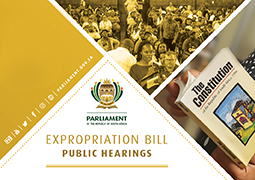
There is general fear that ownership of property accumulated over a lifetime of hard work, dedication and sacrifice could be threatened by the tabling and adoption of the Expropriation Bill. Of particular concern by many in Kathu in the Northern Cape is the expropriation with nil compensation clause.
The Portfolio Committee on Public Works and Infrastructure is currently conducting a nationwide public participation process to garner views on the bill. The committee has over the past three days been in the Northern Cape, holding public hearings to solicit citizens’ views and the bill. The hearings will culminate in the province’s capital of Kimberley.
For one resident, Ms Almine Boysen, who is now a pensioner, the threat is palpable and she doesn’t understand the need to have such a wide-ranging law for people like her. Ms Boysen explained her position: “I worked for more than 38 years and all those years I worked to buy a house to live in with my family until the Lord takes me. I believe it is wrong for government to now tell me that they will take my belongings and leave. Where should I go? Nobody seem to care about that. I am here to beg that this silly thing should not pass.”
These views were echoed by Ms Raibus du Toit, who said she worked hard to ensure security of tenure for her family for generations to come and this is now threatened by the Expropriation Bill. “I have empathy for people with nothing, because like them I had nothing, with the constant fear of what we will eat the next morning. I worked hard to accumulate what I have now, and it is unjust and unfair to have this threatened by this bill,” Ms du Toit emphasised.
For Mr Peter Rass, the bill is unconstitutional and undermines the basic tenant of a democratic dispensation. “Quite honestly, there is enough state land that can be redistributed to quench the desire for land. But also, there must be adequate support for those that get the land, because currently there are large tracts of land that are lying unused after the land was redistributed. Why can’t that be the land that is prioritised?” Mr Rass argued. He believes that passing of this bill will lead South Africa down the same path as Zimbabwe.
Mr Rass also suggested that the Expropriation Bill directly undermines Nelson Mandela’s dream of a rainbow nation, a nation united with people working together. “It seems like that dream is falling apart, because people don’t want to build, but want to tear things apart,” Mr Rass emphasised.
Despite the strong objections to the bill, some supported it. The Khoi-San Traditional House underscored that they require land to practice and commodify their culture, to enable tourism, and directly fight poverty and unemployment. Chief Adam Jacobs from the Khoisan Traditional House said that they are currently not benefitting from historic sites and mines and they hope the bill will change this.
“Within the Gamagara Local Municipality, there are about two farms that have ancient Khoi-San rock [art sites] that we are unable to benefit from. We are also unable to directly benefit from mining ventures in the area, because our land was never restored to its rightful owners,” said Chief Adams.
Despite the disagreements between those that support and oppose the bill, citizens did agree in criticising local government’s capacity to release state land to those that want to use it. This impedes people from unlocking the full potential of that land.
The committee appreciated the valuable contributions made by the public and highlighted that this process brought to life Section 59 of the Constitution, which compels Parliament to facilitate public involvement in the legislative and other processes of the National Assembly and its committees.
“With every public consultation process, we as Members of Parliament are empowered with information and lived experiences of the people of South Africa, which will assist us in drafting and adopting legislations that are responsive to the needs of the people. We also don’t take lightly the willingness by the people to participate in these hearings, even though we continue to face tangible risk of Covid-19,” said Ms Nolitha Ntobongwana, the Chairperson of the committee.
Malatswa Molepo
23 August 2021

